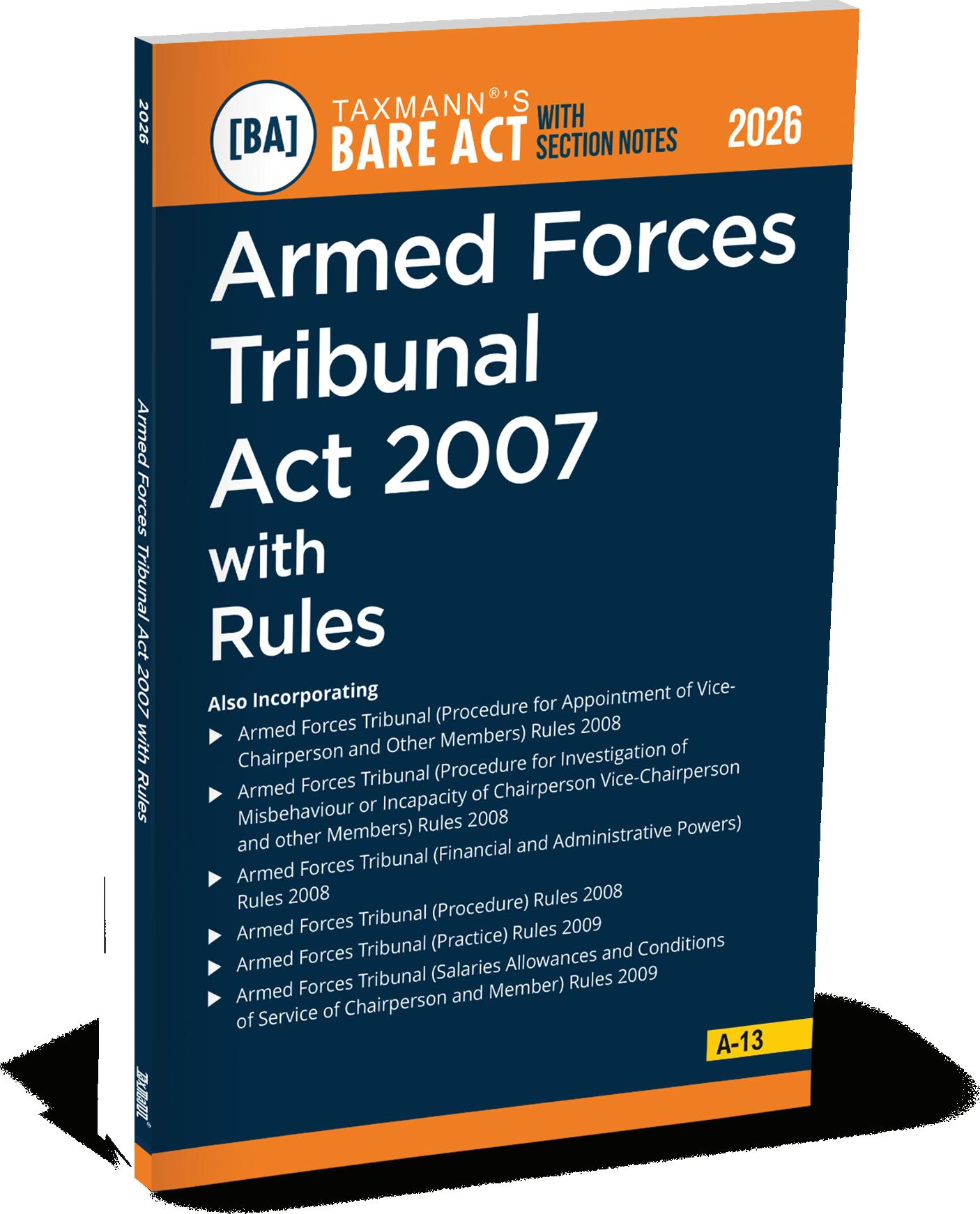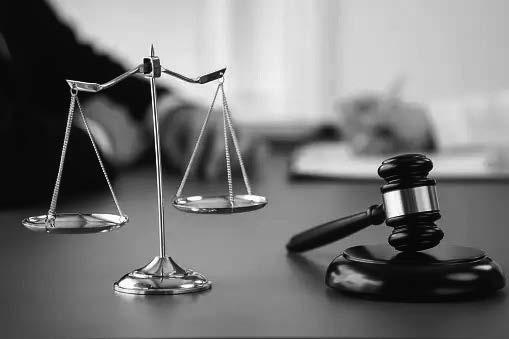ARMED FORCES TRIBUNAL ACT, 2007
38.
ARMED FORCES TRIBUNAL
ARMED FORCES TRIBUNAL
4.
6. Application of the Departmental Inquiries (Enforcement of Witness and Production of Documents) Act,
ARMED FORCES TRIBUNAL (FINANCIAL AND ADMINISTRATIVE POWERS) RULES, 2008
1.
1.
ARMED FORCES TRIBUNAL (PROCEDURE) RULES, 2008
17.
23.
24.
25.
26.
27.
28.
1.
2.
ARMED FORCES TRIBUNAL (PRACTICE) RULES, 2009
3. Preparation of pleadings and other papers
4. Date and signature
5. Attestation
6. Production of authorisation for and on behalf of more than one person
7. Procedure on production of defaced, torn or damaged documents
8. Receipt of papers
9. Date of stamping of papers and maintenance of award Register 52
SCRUTINY, REGISTRATION, NUMBER AND POSTING FOR ADMISSION OR ORDERS
10. Scrutiny of application or petition or other pleadings and papers 52
11. Maintenance of Order Sheet
12. Classi cation of papers
13. Submission of case les to Registrar
14. Registration and Numbering
15. Maintenance of Indian Postal Orders or Demand Drafts Register
16. Recti cation of defects
17. Posting of cases for admission or orders before the Bench
18. Posting of urgent cases
19. Matters to be attended to prior to commencement of sitting
20. Maintenance of Tribunal diary
21. Statutes or Citations for reference
22. Calling of cases in Tribunal
23. Regulation of Tribunal Work
Filing
31. Filing of rejoinder
32. Papers not to form part of the records
33. Incorporation of amendments, ling of additional reply, etc.
PROCEEDINGS BEFORE REGISTRAR’S COURT
35.
37. Inclusion of cases in the ready list when pleadings are complete
38. Maintenance of
41.
42. Carry forward of Daily Cause list and adjournment of cases on account of non-sitting of a
48.
CONTENTS
61. Nomination or engagement of another legal practitioner 64
62. Consent for engaging another legal practitioner 64
63. Restrictions on appearance 64
64. Access to information 64
65. Execution of Vakalatnama 64
REGISTERED CLERKS OF LEGAL PRACTITIONERS
66. Notifying registration and cancellation of Clerks 65
67. Issue of Identity Card 65
68. Access to information by registered clerks 65
69. Carrying out corrections 65
70. Discharge of duties of an absentee clerk 65
71. Presentation and return of papers 65
AFFIDAVITS
72. Title of af davits 66
73. Form and contents of the af davit 66
74. Corrections or erasures, etc. 66
75. Persons authorised to attest 66
76. Af davits of illiterate, blind, etc. 66
77. Identi cation of deponent 66
78. Annexure to the af davit 66
DISCOVERY, PRODUCTION AND RETURN OF DOCUMENTS
79. Application for production of documents, form of summons 67
80. Summoning of documents 67
81. Marking of documents 67
82. Return and transmission of documents 67
EXAMINATION OF WITNESSES AND ISSUE OF COMMISSION
83. Procedure for examination of witnesses, issue of commission, etc. 67
84. Examination in camera 68
85. Form of oath or af rmation to witness 68
86. Form of oath or af rmation to interpreter 68
87. Of cer to administer oath 68
88. Recording of deposition 68
89. Numbering of witnesses 68
CONTENTS
90. Grant of discharge certi cate
91. Payment to witnesses
92. Records to be furnished to the Commissioner
93. Taking of specimen handwriting, signature, etc.
PRONOUNCEMENT OF ORDER
94. Order
95. Operative portion of the Order
96. Corrections
97. Pronouncement of order
98. Pronouncement of order by any one Member of the Bench
99. Authorising any Member to pronounce order
100. Making of entries by Tribunal
101.
of
108. Copies of orders in
109. Form and fee of
110. Right of the party to obtain
114. Scrutiny of copy application, requisitioning of case records and recti cation of defects
115. Determination of additional copying fee
116. Remittance of additional copying fee
117. Order of preparation of certi ed copy
118. Time-limit for issue of urgent or ordinary copy
119. Notifying when copies are ready for delivery and consequence of not taking delivery
120. Proper accounting of copying fee received
121. Preparation and comparison of certi ed copy
122. Re-transmission of case records
123. Mode of delivery of certi ed copy
124. Request for certi ed copy by post
125. Intimation of rejection
126. Supply of free copy only once
127. Certifying on free copies
128. Time for furnishing free copies
129. Furnishing of free copy in a joint application
130. Furnishing of corrected free copy of order
APPEAL TO SUPREME COURT
131. Manner of service of order or notice issued by the Supreme
132.
133.
134. Placing of Supreme Court orders before Chairperson, etc.
135. Circulation of the orders of the
RETENTION AND PRESERVATION OF RECORDS
137.
138.
139.
cation
144. Circuit Benches
145. Use of computers
146. Classi cation of cases
MISCELLANEOUS
147. Furnishing of weekly and monthly statements
148. Inspection of Registry
149. Due compliance with the provisions of the Act and the rules
ARMED FORCES TRIBUNAL (SALARIES, ALLOWANCES AND CONDITIONS OF SERVICE OF CHAIRPERSON AND MEMBER) RULES, 2009
1. Short title and commencement
2. De nitions
3. Pay and Allowances, Leave, Pension, Provident Fund, Travelling Allowance, Leave Travel Concession, Accommodation etc. to the Chairperson and Members of the Armed Forces Tribunal
4. Residuary Provision
5. Powers to relax rules
Armed Forces Tribunal Act, 2007
[55 OF 2007]1
An Act to provide for the adjudication or trial by Armed Forces Tribunal of disputes and complains with respect to commission, appointments, enrolment and conditions of service in respect of persons subject to the Army Act, 1950, the Navy Act, 1957 and the Air Force Act, 1950 and also to provide for appeals arising out of orders, findings or sentences of court martial held under the said Acts and for matters connected therewith or incidental thereto.
BE it enacted by Parliament in the Fifty eighth Year of the Republic of India as follow:—
CHAPTER 1 PRELIMINARY
Short title and commencement.
1. (1) This Act may be called the Armed Forces Tribunal Act, 2007.
(2) It shall come into force on such date2 as the Central Government may, by notification, appoint.
Applicability of the Act.
2. (1) The provisions of this Act shall apply to all persons subject to the Army Act, 1950 (46 to 1950), the Navy Act, 1957 (62 of 1957) and Air Force Act, 1950 (45 of 1950).
(2) This Act shall also apply to retired personnel subject to the Army Act, 1950 (46 of 1950) or the Navy Act, 1957 (62 of 1957) or the Air Force Act, 1950 (45 of 1950), including their dependants, heirs and successors, in so far as it relates to their service matters.
Definitions.
3. In this Act, unless the context otherwise requires,—
(a) “Administrative Member” means a member of the Tribunal who is not Judicial Member within the meaning of clause (g);
(b) “application” means an application made under sub-section (2) of section 14;
1. Dated 25-12-2007.
2. Enforced with effect from 15-6-2008: vide Notification No. S.R.O. 14(E), dated 13-6-2008.
(c) “appointed day” means the date with effect from which the Tribunal is established by notification under section 4;
(d) “Bench” means a Bench of the Tribunal;
(e) “Chairperson” means the Chairperson of the Tribunal;
(f) “court martial” means a court martial held under the Army Act, 1950 (46 of 1950) or the Navy Act, 1957 (62 of 1957) including the disciplinary courts constituted under the Act or the Air Force Act, 1950 (45 of 1950);
(g) “Judicial Member” means a member of the Tribunal appointed as such under this Act, and includes the Chairperson, who possesses any of the qualifications specified in sub-section (2) of section 6;
(h) “Member” means a member (whether Judicial or Administrative) of the Tribunal and includes the Chairperson;
(i) “military custody” means the arrest or confinement of a person according to the usages of the service and includes naval or air force custody;
(j) “notification” means a notification published in the Official Gazette;
(k) “prescribed” means prescribed by rules made under this Act;
(l) “President” means the President of India;
(m) “rules” means the rules made under this Act;
(n) “service” means the service within or outside India;
(o) “service matters”, in relation to the persons subject to the Army Act, 1950 (46 of 1950), the Navy Act, 1957 (62 of 1957) and the Air Force Act, 1950 (45 of 1950), mean all matters relating to the conditions of their service and shall include—
(i) remuneration (including allowances), pension and other retirement benefits;
(ii) tenure, including commission, appointment, enrolment, probation confirmation, seniority, training, promotion, reversion, premature retirement, superannuation, termination of service and penal deductions;
(iii) summary disposal and trials where the punishment of dismissal is awarded;
(iv) any other matter, whatsoever, but shall not include matters relating to—
(i) orders issued under section 18 of the Army Act, 1950 (46 of 1950), sub-section (1) of section 15 of the Navy Act, 1957 (62 of 1957) and section 18 of the Air Force Act, 1950 (45 of 1950); and
(ii) transfers and postings including the change of place or unit on posting whether individually or as a part of unit, formation or ship in relation to the persons subject to the Army Act, 1950 (46 of 1950) the Navy Act, 1957 (62 of 1957) and the Air Force Act, 1950 (45 of 1950):
(iii) leave of any kind;
(iv) summary court martial except where the punishment is of dismissal or imprisonment for more than three months;
(p) “summary disposals and trials” means summary disposals and trials held under the Army Act, 1950 (46 of 1950), the Navy Act, 1957 (62 of 1957) and the Air Force Act, 1950 (45 of 1950);
(q) “Tribunal” means the Armed Forces Tribunal established under section 4.
COMMENTS
SECTION NOTES
3.1 Definition of “Service Matters” [Section 3(o)]
Section 3(o) is applicable in relation to persons subject to the Army Act, 1950 (46 of 1950), the Navy Act, 1957 (62 of 1957), and the Air Force Act, 1950 (45 of 1950).
“Service matters” mean all matters relating to the conditions of their service.
“Service matters” shall include the following:
Remuneration, including allowances.
Pension.
Other retirement benefits.
Tenure, including commission, appointment, enrolment, probation, confirmation, seniority, training, promotion, reversion, premature retirement, superannuation, termination of service, and penal deductions.
Summary disposal and trials where the punishment of dismissal is awarded.
Any other matter whatsoever.
“Service matters” shall not include matters relating to the following: Orders under Specific Act Provisions:
Orders issued under section 18 of the Army Act, 1950 (46 of 1950).
Orders issued under sub-section (1) of section 15 of the Navy Act, 1957 (62 of 1957).
Orders issued under section 18 of the Air Force Act, 1950 (45 of 1950).
Transfers and Postings:
Transfers and postings in relation to persons subject to the Army Act, 1950 (46 of 1950), the Navy Act, 1997 (62 of 1957), and the Air Force Act, 1950 (45 of 1950).
This exclusion includes the change of place or unit on posting, whether individually or as a part of a unit, formation, or ship.
Leave of any kind.
Certain Summary Court Martials
Summary court martial, except where the punishment is of:
- Dismissal or of
- Imprisonment for more than three months.
CHAPTER II
ESTABLISHMENT OF TRIBUNAL AND BENCHES THEREOF
Establishment of Armed Forces Tribunal.
4. The Central Government shall, by notification, establish a Tribunal to be known as the Armed Forces Tribunal to exercise the jurisdiction, powers and authority conferred on it by or under this Act.
Composition of Tribunal and Benches thereof.
5. (1) The Tribunal shall consist of a Chairperson, and such number of Judicial and Administrative Members as the Central Government may deem fit and, subject to the other provisions of this Act, the jurisdiction, powers and authority of the Tribunal may be exercised by Benches thereof.
(2) Subject to the other provisions of this Act, a Bench shall consist of one Judicial Member and one Administrative Member.
(3) Notwithstanding anything contained in sub-section (1), the Chairperson—
(a) may, in addition to discharging the functions of a Judicial Member of the Beach to which he is appointed, discharge the functions of an Administrative Member of any other Bench;
(b) may transfer a Member from one Bench to another Bench;
(c) may, for the purpose of securing that any case or cases, which having regard to the nature of the questions involved, requires or require, in this opinion, or under the rules made under this Act, to be decided by a Bench composed of more than two members, issue such general or special orders, as he may deem fit:
Provided that every Bench constituted in pursuance of this clause shall include at least one Judicial Member and one Administrative Member.
(4) Subject to the other provisions of this Act, the Benches of the Tribunal shall ordinarily sit at Delhi (which shall be known as the Principal Bench), and at such other places as the Central Government may, by notification, specify.
Qualifications for appointment of Chairperson and other Members.
6. (1) A person shall not be qualified for appointment as the Chairperson unless he is a retired Judge of the Supreme Court or a retired Chief Justice of a High Court.
(2) A Person shall not be qualified for appointment as a Judicial Member unless he is or has been a Judge of a High Court.
(3) A person shall not be qualified for appointment as an Administrative Member unless—
(a) he has held or has been holding the rank of Major General or above for a total period of at least three years in the Army or equivalent rank in the Navy or the Air Force; 3[or]
3. Substituted for “and” by the Armed Forces Tribunal Act (Removal of Difficulties) Order, 2008, w.e.f. 21-7-2008.
(
b) he has served for not less than one year as Judge Advocate General in the Army or the Navy or the Air Force, and is not below the rank of Major General, Commodore and Air Commodore respectively.
Explanation.— When a serving person is appointed as an Administrative Member, he shall have retired from service prior to assuming such appointment.
Appointment of Chairperson and other Members.
7. (1) Subject to the provisions of the section, the Chairperson and other Members of the Tribunal shall be appointed by the President:
Provided that no appointment under this sub-section shall be made except after consultation with the Chief Justice of India.
(2) The President may appoint one or more Members of the Tribunal to the Vice-Chairperson, or, as the case may be, the Vice-Chairperson thereof.
Term of office.
8. The Chairperson or a Member shall hold office for a term of four years from the date on which he enters upon his office and shall be eligible for re-appointment:
Provided that no Chairperson shall hold office as such after he has attained,—
(a) in case he has been a Judge of the Supreme Court, the age of seventy years; and
(b) in case he has been the Chief Justice of a High Court, the age of sixty-five years:
Provided further that no other Member shall hold office as such Member after he has attained the age of sixty five years.
Resignation and removal.
9. (1) The Chairperson or a Member may, by notice in writing under his hand addressed to the President, resign his office:
Provided that the Chairperson or a Member shall, unless he is permitted by the President to relinquish his office sooner, continue to hold office until the expiry of three months from the date of receipt of such notice or until a person duly appointed as his successor enters upon his office or until the expiry of his term of office, whichever is the earliest.
(2) The Chairperson or a Member shall not be removed from his office except by an order made by the President on the ground of proved misbehaviour or incapacity after an inquiry made by a sitting Judge of the Supreme Court in which such Chairperson or other Member had been informed of the charges against him and given a reasonable opportunity of being heard in respect of those charges.
(3) The Central Government may, by rules, regulate the procedure for the investigation of misbehaviour or incapacity of the Chairperson or other Member referred to in sub-section (2).






